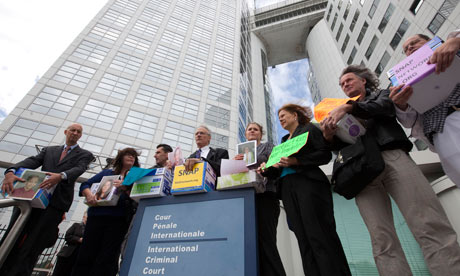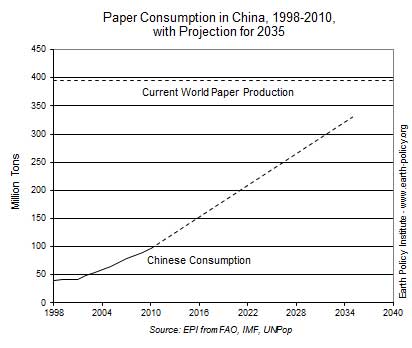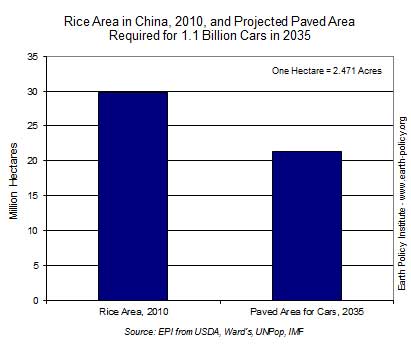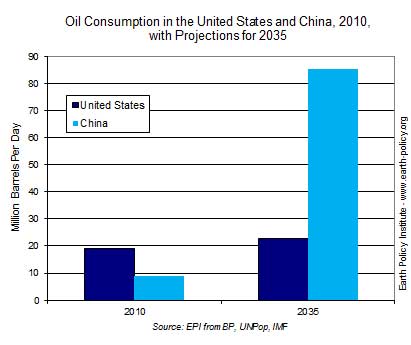By Brendan P
O'Reilly
Speaking Freely is an Asia Times Online feature that
allows guest writers to have their say. Please click here
if you are interested in contributing. "At present, we
are stealing the future, selling it in the present, and calling it GDP."
-
Paul Hawken There is a dangerous lie that permeates
the media, government and general discourse of nearly every single nation on
Earth.
That lie is the Development Deception. This myth is based on
three concepts. First is the distinction between the developed nations (North America, Western Europe, Australia, New Zealand, South Korea, and
Japan), and the Developing Nations (everywhere else).
The second idea is
that "developing" countries can become "developed" through improved education,
stable governance, and opening their markets to trade and investment. The third
leg of this Deception is that such a transformation is not only possible, but
also desirable.
The metric used to distinguish "developed" nations from
"developing" nations is gross domestic product (GDP) per capita. Poor nations
aspire to reach a certain economic level to become so-called "developed
nations". The Myth of Development has four fundamental inter-related flaws. The
first one is the problem of the Gray Area.
The gap between "developed"
and "developing" countries is presented as a simple black-and-white dichotomy. I
often hear from my Chinese students say, "China is a developing country. America
is a developed country. We want to become a developed country."
Fair
enough. But which country has high-speed trains? Which country has a higher
unemployment rate? How can the government of a "developed" country owe trillions
of dollars to a "developing" country?
Obviously many nations in Asia and
Africa, and Latin America have very serious structural problems, which could be
alleviated through stable government and educational reform. Very poor countries
should aspire to create social and economic institutions that allow their people
to live with dignity. Nevertheless the rise of new economic powers such as
Brazil, India, and (especially) China, coupled with the massive financial
difficulties faced by Europe, Japan, and the United States, call into question
the utility of the developed/developing dichotomy.
The second problem
with the Myth of Development is philosophical. The very term "development"
implies a steady linear progression from poverty and ignorance to wealth,
literacy, and general happiness. This viewpoint is Western in origin, and alien
to many of the world’s cultures.
The idea of the inexorable march of
progress has roots in the Judeo-Christian worldview of time (God creates the
world, the world exists, the world ends), and has been largely co-opted by
modern science. We are told to believe that progress is inevitable, that the
quality of life for each new generation will be better than the life of their
parents. Never mind the fact that humanity has created weapons that empower a
handful of political leaders to destroy civilization itself.
Never mind
obesity is now challenging starvation as a cause of premature death. Of course,
the advances made in the last century in curing diseases, increasing literacy
rates, and fighting hunger must be lauded. However, to blindly value "progress"
above all else threatens our very survival as a species.
The third
problem with the Development Deception stems from definitions. As mentioned
previously, GDP per capita is the standard the yardstick for measuring
development. This assessment ignores serious social difficulties faced by the
so-called developed nations.
For example, a third of the adult
population of the United States of America, the archetype "developed" nation,
suffer from obesity, with another third classified as overweight. The United
States of America also has the dubious distinction of having the highest
incarceration rate of any nation on Earth.
Meanwhile Japan, the paragon
of "development" in Asia, has one of the lowest fertility rates in the world,
leading to a rapidly aging population. This trend, unless dramatically reversed,
will exacerbate Japan’s social, economic, and political crisis, as more retirees
put enormous strain on the working population. Japan’s population is set to
shrink by roughly thirty million over the next four decades (Citation
here). Are
these worthy goals for the so-called "developing" nations to aspire to?
The fourth and final problem with the Myth of Development is a terminal
defect. Citizens in countries such as China and India are encouraged to join the
middle class and live "Western" lifestyles. As benign as it sounds, this goal is
completely impossible. Simply put, there are not enough natural resources on
this planet to sustain such an increase in consumption.
According to
World Bank figures, in 2008 Americans, on average, used 87,216 kilowatt hours of
electricity. The average Chinese used 18,608 kilowatt hours, and the average
Indian 6,280. All three countries depend primarily on coal for electricity. To
bridge the gap between these levels of resource utilization of would entail
environmental catastrophe and global shortages on an unimaginable scale. Coal is
just one example - one could also look at oil, lumber, or meat consumption.
Indeed, many of the fundamental challenges facing the world economic system -
such as rising food and fuel costs - are directly related to economic
development.
The Development Deception is perpetuated by international
corporations and national governments. Resource mining, production, and
overconsumption are the basis for the current globalized economic system. Human
beings are classified as "consumers", because overconsumption entails short-term
profit.
Rich nations leverage their "developed" status to influence
poorer nations, while the governments of these poor nations use the promise of
development to maintain political power. None of this propaganda changes the
fact that it is grossly misleading for the nations who over-consume the Earth’s
finite resources to be considered developed.
Advocates of The
Development Myth may point to science as a savior. We are constantly told that
new inventions will allow for more efficient use of resources, or allow for
sustainable consumption patterns. This argument provides only false hope. We
cannot speculate our way out of environmental pollution and a collapsing natural
resource base. Unless and until new "green" technology actually exists and is
utilized, science is actually exacerbating ecological disaster.
Recently, the Human Development Index (HDI) has been promoted as a more
"human-centered" alternative to GDP as a metric for measuring development. HDI
uses data on life expectancy, literacy, number of years in school, and GDP to
determine the development status of a country. Although this presents a useful
alterative, the continued use of GDP as a basis for measuring development is
HDI’s fundamental flaw. Unsustainable consumption of finite resources cannot
reasonably be classified as "development".
What is the viable
alternative to the Development Myth? Bhutan has advocated Gross National
Happiness as an alternative goal to increasing GDP per capita. Citizens are
asked about their Subjective Well Being in order to establish Gross National
Happiness. Obviously this measurement is difficult to define and numerate, and
ignores problems such as illiteracy and extreme poverty. However, it does point
in the right direction.
Development needs to be redefined in order to
account for human physical and emotional well-being as well as environmental
sustainability. Otherwise it is only a lie, and a dangerous one at that. To seek
economic advance at the expense of human interests and future generations is a
recipe for global disaster.
When extreme wealth is challenging extreme
poverty as the bane of human existence, a revolution of values is needed. We as
a species must advance values of conservation, and teach people to live within
the means of the productive capacity of our planet. No longer can the scramble
for nonrenewable resources be viewed as a zero-sum game. Human beings need to
develop solidarity on a global scale. Citizens of wealthy nations must learn to
live with less.
The most important development is that of the
individual. Social and spiritual harmony is the antidote to the Development
Deception, for all traditions encourage compassion and warn of the destructive
power of greed. To quote LaoZi (as translated by D C Lau):
There is no crime greater than having too many desires;
There
is no disaster greater than not being content;
There is no misfortune
greater than being covetous.
Hence in being content, one will always have
enough.
Brendan P O'Reilly is a China-based writer
and educator from Seattle. He is author of The Transcendent Harmony.







